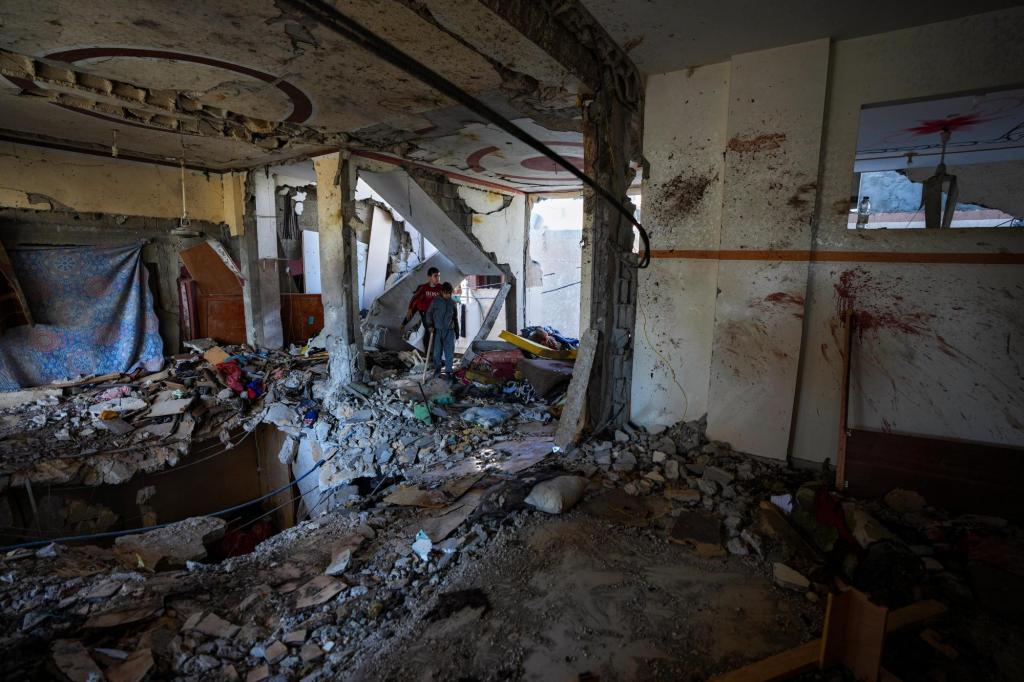Devastating Toll of the Israel-Hamas Conflict: Over 46,000 Palestinian Lives Lost
Deir Al-Balah, Gaza Strip — The ongoing Israel-Hamas war has claimed the lives of more than 46,000 Palestinians, according to the Gaza Health Ministry. The protracted conflict, which has lasted for 15 months, shows no signs of abating.
The Health Ministry reports a staggering total of 46,006 fatalities and 109,378 injuries among the Palestinian population. More than half of those who have died are women and children, although the ministry does not specify the number of deceased fighters versus civilians.
Casualties and Military Claims
The Israeli military claims to have killed over 17,000 combatants, yet it has provided no evidence to support this assertion. According to Israeli officials, they strive to minimize civilian casualties, placing the onus for these losses on Hamas, which operates within residential neighborhoods. Israeli strikes have also targeted alleged Hamas fighters in shelters and hospitals, resulting in the tragic deaths of women and children. Hamas has been designated a terrorist organization by the United States, Canada, and the European Union.
Faint Hopes for Ceasefire
In recent weeks, there have been indications that Israel and Hamas may be edging toward a ceasefire agreement and the release of hostages. U.S. Secretary of State Antony Blinken expressed optimism this week, stating that a deal is "very close," with hopes to finalize it before the Trump administration assumes control of U.S. diplomacy. However, past optimism from U.S. officials has often been met with stalled negotiations.
The conflict began on October 7, 2023, when Hamas militants launched a surprise attack on Israel, resulting in approximately 1,200 deaths, predominantly civilians, and the abduction of around 250 individuals. Currently, about 100 hostages remain in Gaza, with Israeli authorities believing that at least a third perished during the initial assault or while in captivity.
Destruction and Displacement in Gaza
The war has ravaged vast swaths of Gaza and displaced nearly 90% of its 2.3 million residents, many of whom have fled their homes multiple times. Hundreds of thousands are living in overcrowded tent camps along the coast, facing dire shortages of food and basic necessities.
Fatma Abu Awad, who recently lost six family members in two separate Israeli strikes, shared her heartbreak. “We’ve been waiting every day for news about a truce — yet all we receive are updates of my son and daughter-in-law and her children being killed,” she lamented at a shelter in Khan Younis.
After praying over her family’s graves, marked only with makeshift headstones, she expressed the depth of her despair: “What we are living is not a life. Nobody could endure this situation for even a day.”
Voices of the Displaced
Munawar al-Bik, another displaced woman, reflected on the unbearable conditions in Khan Younis. “We wake up hearing cries of the men at night, mourning the unbearable situation,” she explained. “We are out of energy; we want this to end today.”
On Thursday, funeral prayers were held outside Al-Aqsa Martyrs Hospital in Deir al-Balah for those killed the previous day. In the morgue, a grieving family member was seen kneeling before a relative’s body before expressing his anguish in a heartbreaking display.
Palestinian health officials reported that airstrikes on Wednesday had killed at least nine individuals, including three infants and two women.
Malak Abu Awad, part of the family that lost six relatives in recent airstrikes, highlighted the desperation for a truce: “Every day we hope for ceasefire negotiations, but it feels futile. We have lost more loved ones instead of seeing the end of this conflict.”
Calls for Ceasefire from All Sides
In Israel, relatives of hostages who have died in captivity are amplifying calls for a ceasefire. Following the recovery of the body of 53-year-old hostage Yosef AlZayadni from a tunnel in southern Gaza, family members are urging the Israeli government and international leaders to negotiate a resolution.
“Military pressure endangers the lives of the hostages,” stressed Meirav Svirsky, whose brother lost his life while held captive. “The government must shift its focus from continued fighting to saving lives and ensuring the return of all hostages.”
The ongoing suffering in both Gaza and Israel underscores the urgent need for a resolution to the conflict, as communities on both sides grapple with untold loss and heartache.


